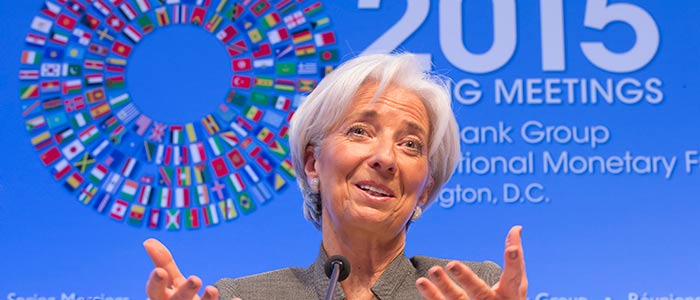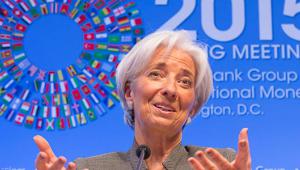WEb_IMF_ChristineLagarde_17169021875_5ac675797e_o.jpg

Christine Lagarde. Credit: IMF Staff Photo/Stephen Jaffe
Speaking at the IMF annual meetings in Washington, Lagarde said free trade had been the engine of growth for many years, and in a time of stagnating GDP it was crucial to keep those cogs turning.
“We know that globalisation has worked over the years, that it has delivered great benefits to many people,” she said. “We do not think that it is time to push against it, and we believe it is actually time to push forward with what we know has worked.”
However, she conceded the globalisation of the future “needs to be slightly different”, acknowledging that not everyone has benefited from open, international markets.
Instead, these have left many worse off, from workers in US industrial towns, who lost their careers as factories moved abroad, to the other side of the Atlantic in the UK, where the arrival of cheap foreign labour pushed the lowest wages down.
In both those places, the backlash is evident. The Brexit vote and the rise of US presidential candidate Donald Trump mark a clear rejection of globalisation and openness, which has for many failed to live up to its promise.
Elsewhere, too, populist policies talk of closing off economies to protect domestic markets from the negative consequences of an increasingly connected world.
Lagarde said these consequences must be addressed. “The inclusiveness, the determination to make [globalisation] work for all and to pay attention to those who are at risk of being left out – whether it is as a result of technology, digital economy or international trade – that factor has to be taken into account.”
She declined to comment on the US presidential elections directly. But her message to the proponents of protectionism was clear: “What we are seeing in terms of political dynamics and rhetoric against trade would, in our view, do harm to the economy. I have called it economic malpractice.
“Trade has been a main engine for growth. If we want better growth ... we need that engine.”
World Bank president Jim Yong Kim, also speaking at the fund’s annual meetings, too mounted a defence of free trade, albeit less directly.
He said China had lifted 700 million people out of poverty by opening up its economy.
The uncertainty generated by the US presidential race, the Brexit vote and European elections was a risk, he said, and of a kind that is “normally very bad for most developing countries”.
The IMF has agreed that political hostility to trade and openness is one of the biggest risks to the already fragile world economy.
In an outline of her global policy agenda, she said retreating from globalisation and multilateralism would be a grave move in a time “when international cooperation and coordination are as critical as ever”.
She said a concerted and synchronised global push for better growth could revive the world economy, and reiterated her call for a “three-pronged” approach that leverages and exploits synergies between monetary, fiscal and structural measures.
She singled out countries like Germany, Korea and Canada, which the fund sees as not fully exploiting their available fiscal space.
“Given the very, very low financing costs, in particular for a country like Germany, it is certainly the right time to develop that infrastructure and to contribute to the collective effort I have referred to.
“We believe there has to be more international cooperation, because it will benefit all countries. If they pull together in a more coordinated way, positive spillovers will reinforce each other.”
While Lagarde was quiet on managing high world debt levels, which the IMF recently warned could trigger a fresh financial crisis, Kim said he was not concerned about the growing debt burden on African nations.
“I am not yet concerned that we’re reaching a debt crisis level, certainly not in most of sub-Saharan Africa. But we have to watch it,” he said.











